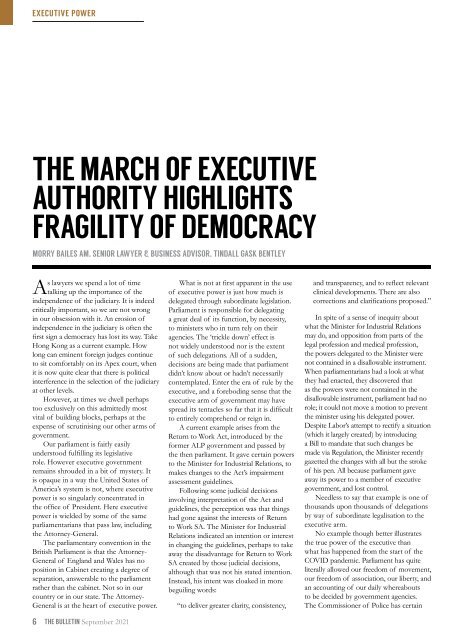LSB September 2021 LR
You also want an ePaper? Increase the reach of your titles
YUMPU automatically turns print PDFs into web optimized ePapers that Google loves.
EXECUTIVE POWER<br />
THE MARCH OF EXECUTIVE<br />
AUTHORITY HIGHLIGHTS<br />
FRAGILITY OF DEMOCRACY<br />
MORRY BAILES AM, SENIOR LAWYER & BUSINESS ADVISOR, TINDALL GASK BENTLEY<br />
As lawyers we spend a lot of time<br />
talking up the importance of the<br />
independence of the judiciary. It is indeed<br />
critically important, so we are not wrong<br />
in our obsession with it. An erosion of<br />
independence in the judiciary is often the<br />
first sign a democracy has lost its way. Take<br />
Hong Kong as a current example. How<br />
long can eminent foreign judges continue<br />
to sit comfortably on its Apex court, when<br />
it is now quite clear that there is political<br />
interference in the selection of the judiciary<br />
at other levels.<br />
However, at times we dwell perhaps<br />
too exclusively on this admittedly most<br />
vital of building blocks, perhaps at the<br />
expense of scrutinising our other arms of<br />
government.<br />
Our parliament is fairly easily<br />
understood fulfilling its legislative<br />
role. However executive government<br />
remains shrouded in a bit of mystery. It<br />
is opaque in a way the United States of<br />
America’s system is not, where executive<br />
power is so singularly concentrated in<br />
the office of President. Here executive<br />
power is wielded by some of the same<br />
parliamentarians that pass law, including<br />
the Attorney-General.<br />
The parliamentary convention in the<br />
British Parliament is that the Attorney-<br />
General of England and Wales has no<br />
position in Cabinet creating a degree of<br />
separation, answerable to the parliament<br />
rather than the cabinet. Not so in our<br />
country or in our state. The Attorney-<br />
General is at the heart of executive power.<br />
What is not at first apparent in the use<br />
of executive power is just how much is<br />
delegated through subordinate legislation.<br />
Parliament is responsible for delegating<br />
a great deal of its function, by necessity,<br />
to ministers who in turn rely on their<br />
agencies. The ‘trickle down’ effect is<br />
not widely understood nor is the extent<br />
of such delegations. All of a sudden,<br />
decisions are being made that parliament<br />
didn’t know about or hadn’t necessarily<br />
contemplated. Enter the era of rule by the<br />
executive, and a foreboding sense that the<br />
executive arm of government may have<br />
spread its tentacles so far that it is difficult<br />
to entirely comprehend or reign in.<br />
A current example arises from the<br />
Return to Work Act, introduced by the<br />
former ALP government and passed by<br />
the then parliament. It gave certain powers<br />
to the Minister for Industrial Relations, to<br />
makes changes to the Act’s impairment<br />
assessment guidelines.<br />
Following some judicial decisions<br />
involving interpretation of the Act and<br />
guidelines, the perception was that things<br />
had gone against the interests of Return<br />
to Work SA. The Minister for Industrial<br />
Relations indicated an intention or interest<br />
in changing the guidelines, perhaps to take<br />
away the disadvantage for Return to Work<br />
SA created by those judicial decisions,<br />
although that was not his stated intention.<br />
Instead, his intent was cloaked in more<br />
beguiling words:<br />
“to deliver greater clarity, consistency,<br />
and transparency, and to reflect relevant<br />
clinical developments. There are also<br />
corrections and clarifications proposed.”<br />
In spite of a sense of inequity about<br />
what the Minister for Industrial Relations<br />
may do, and opposition from parts of the<br />
legal profession and medical profession,<br />
the powers delegated to the Minister were<br />
not contained in a disallowable instrument.<br />
When parliamentarians had a look at what<br />
they had enacted, they discovered that<br />
as the powers were not contained in the<br />
disallowable instrument, parliament had no<br />
role; it could not move a motion to prevent<br />
the minister using his delegated power.<br />
Despite Labor’s attempt to rectify a situation<br />
(which it largely created) by introducing<br />
a Bill to mandate that such changes be<br />
made via Regulation, the Minister recently<br />
gazetted the changes with all but the stroke<br />
of his pen. All because parliament gave<br />
away its power to a member of executive<br />
government, and lost control.<br />
Needless to say that example is one of<br />
thousands upon thousands of delegations<br />
by way of subordinate legalisation to the<br />
executive arm.<br />
No example though better illustrates<br />
the true power of the executive than<br />
what has happened from the start of the<br />
COVID pandemic. Parliament has quite<br />
literally allowed our freedom of movement,<br />
our freedom of association, our liberty, and<br />
an accounting of our daily whereabouts<br />
to be decided by government agencies.<br />
The Commissioner of Police has certain<br />
6<br />
THE BULLETIN <strong>September</strong> <strong>2021</strong>


















